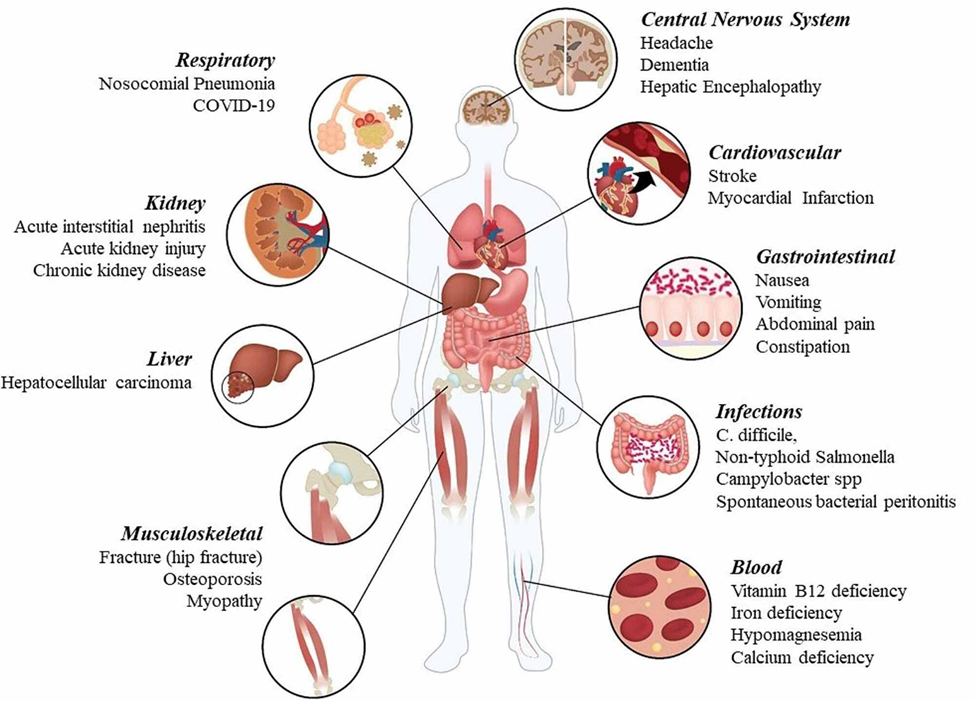Proton pump inhibitors (PPIs) are pharmaceutical drugs that prevent the release of hydrochloric acid, the compound produced in the stomach to initiate protein digestion, enable nutrient absorption from food, and kill off dangerous pathogens that may be ingested. The PPI class of drugs treats ulcers and Zollinger-Ellison syndrome, though they are widely prescribed for “indigestion or heartburn.” The time and dosing of PPIs should be minimized due to the risk of serious adverse effects, including (Yibirin 2021, Koyyada 2021, Kines 2016):
Anemia
Cardiovascular events, including myocardial infarction and stroke
C. difficile and other GI infections
Congenital malformations
Coronavirus infections, especially with gastric acid pH above 3
Decreased bone mineral density with long-term use
Dysbiosis
Gastric polyps
Hepatotoxicity
H. pylori infection
Hypergastrinemia (compensation for hypochlorhydria)
Hypochlorhydria
Hypomagnesemia
Impaired nutrient absorption
Increased symptoms of reflux
Infections
Kidney damage and disease
Liver disease, cirrhosis, liver cancer
Lupus, subacute
Micronutrient deficiencies, e.g., vitamin B12, vitamin C, calcium, magnesium, potassium, zinc, iron
Neuroendocrine tumors, GI tumors, gastric cancer
Neurological complications, e.g., headache, dizziness, vertigo, insomnia, mood changes
Pneumonia and other respiratory infections
Rebound hypersecretion of stomach acid
Small intestine bacterial overgrowth (SIBO)
Urinary tract infections
Electrolyte disturbances, including hypocalcemia, hypomagnesemia, and hypokalemia, can be life-threatening and must be screened for in those taking PPI drugs, especially with long-term use. Interactions with other medications must also be addressed, including the masking of hypocalcemia and hypomagnesemia with thiazide diuretic use (Uehara 2019), and the increased risk of a major cardiac event when combining PPIs with certain anti-platelet drugs (Koyyada 2021).
Although PPIs are one of the 10 most prescribed drugs throughout the world, they are often prescribed for the treatment of heartburn or gastritis with little to no diagnostic evidence. The use of PPIs often focuses on symptom relief and not the underlying causes of dysfunction, which can include weak lower esophageal sphincter pressure, hiatal hernia, abdominal obesity, or overconsumption of fat at a meal.
Ironically, PPIs themselves may increase reflux symptoms or cause rebound hypersecretion of hydrochloric acid once discontinued. They may be prescribed for symptoms caused by hypochlorhydria and not hyperchlorhydria, further complicating the clinical course. Hypochlorhydria itself is associated with complications, including autoimmune dysfunction, food allergies, maldigestion, micronutrient deficiencies, and compromised bone health. A comprehensive functional nutrition approach is necessary to fully explore the causes of gastrointestinal symptoms and resolve them without further complications or adverse outcomes (Kines 2016).

Source: Yibirin, Marcel et al. “Adverse Effects Associated with Proton Pump Inhibitor Use.” Cureus vol. 13,1 e12759. 18 Jan. 2021, doi:10.7759/cureus.12759 This is an open access article distributed under the terms of the Creative Commons Attribution License CC-BY 4.0.,
 References
ReferencesKines, Kasia, and Tina Krupczak. “Nutritional Interventions for Gastroesophageal Reflux, Irritable Bowel Syndrome, and Hypochlorhydria: A Case Report.” Integrative medicine (Encinitas, Calif.) vol. 15,4 (2016): 49-53.
Koyyada, Arun. “Long-term use of proton pump inhibitors as a risk factor for various adverse manifestations.” Therapie vol. 76,1 (2021): 13-21. doi:10.1016/j.therap.2020.06.019
Uehara, Atsuko et al. “Proton-pump Inhibitor-induced Severe Hypomagnesemia and Hypocalcemia are Clinically Masked by Thiazide Diuretic.” Internal medicine (Tokyo, Japan) vol. 58,15 (2019): 2201-2205. doi:10.2169/internalmedicine.2608-18
Yibirin, Marcel et al. “Adverse Effects Associated with Proton Pump Inhibitor Use.” Cureus vol. 13,1 e12759. 18 Jan. 2021, doi:10.7759/cureus.12759 his is an open access article
distributed under the terms of the Creative Commons Attribution License CC-BY 4.0.,